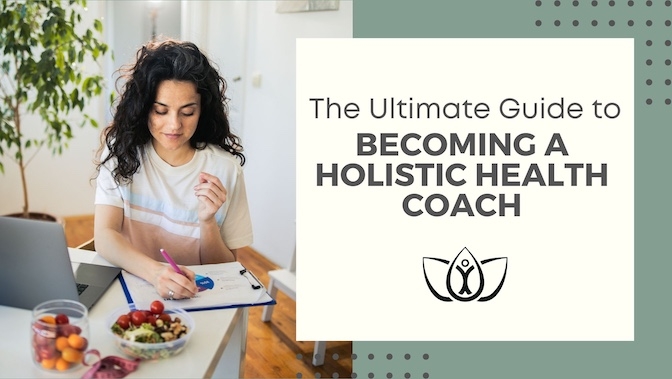.png) Discover the essential steps to becoming a holistic health coach, including certifications, skills, and career opportunities. Start your journey today!
Discover the essential steps to becoming a holistic health coach, including certifications, skills, and career opportunities. Start your journey today!
A new, yet ancient, wave of healthcare that looks beyond physical health to consider a person's overall wellness has gained popularity in recent years. This approach to healthcare, often referred to as "holistic health," evaluates an individual's mental, emotional, physical, and spiritual health to determine how to improve overall health and bring about a higher quality of life.
When people become interested in leading healthy, balanced lives, they look for guidance. That's where holistic health coaches make a difference. Working as a health coach could be a great career choice for people who are passionate about helping others by guiding them to find balance through nutrition and other lifestyle changes. This career is the full package, allowing you to empower others while improving your life in the process.
Does this sound like it could be a fit for you? First and foremost, becoming a holistic health coach requires proper training and certification. Read on to learn more about the role of a holistic health coach, the steps to become a health coach, and techniques used in practice.
The Role of a Holistic Health Coach
The holistic health coach is an important source of support and positive influence who guides individuals through their wellness journey. Health coaches will start the process by asking clients to complete informational forms. These forms prompt clients to describe their present and past health concerns and provide information about their current lifestyle choices. A health coach also seeks details about the individual's home life, work, personality, goals, and beliefs, which can help them understand the needs and challenges of their clients. Then, health coaches can educate clients to make better choices and create a long-term plan that is broken down into small, achievable goals tailored to the client's life and interests. A client can expect to learn about food choices, water intake, exercise, sleep habits, and natural health techniques such as skin brushing, aromatherapy, or supplement use.
Great holistic health coaches encourage clients to overcome challenges and help them build self-confidence. Throughout the coaching process, health coaches should aim to help clients discover more about themselves and keep them accountable, understanding that this is not just a physical but also a mental and emotional process.
A holistic health coach also helps people make lasting changes and fosters sustainable wellness by empowering them to participate actively in their health. Clients can gain valuable insights into their habits and become confident in making choices congruent with their health goals.
Steps to Become a Holistic Health Coach

To begin a holistic health coach career, start by finding the right certification program for you. After graduation, crafting a comprehensive business plan that clearly defines your objectives and action steps is essential. Here are some steps to follow:
Enroll In A Health Coach Program
A health coach program should provide the training to effectively assess client needs, guide others toward their goals, and give safe and beneficial lifestyle advice within their scope of practice. During your studies, you should learn about the human body systems and how lifestyle changes can support their function. At a minimum, a health coach program should teach you coaching strategies, legalities, nutrition, and emotional support tools. Some programs may include additional natural health practices and education about techniques such as pH balancing, Bach flower essences, physical observations, and iridology. A program that also teaches you how to start and run your own natural health business is an impactful benefit to look for as well.
Beyond curriculum, you should consider what learning environment works best for you, online or in-person. From there, assess how much interaction and support you'll have with your instructors and classmates. You'll also want to determine if the curriculum is taught in a manner that works well for your learning style. Finally, if you have any learning challenges, ask the school what accommodations can be made to support you.

Earning a Certification
Whether your school is 100% online, in-person, or a hybrid, your program will likely provide information through lectures, quizzes, and discussions. There will also likely be an exam at the end of each course. Some programs require you to gain additional training by practicing your coaching skills with your classmates, friends, or family. It's important to remain on track to graduate, so set aside time each week to study, complete assignments, and ask your teachers questions. Once you graduate, your school will present you with your certification and an accompanying title, which vary and are specific to the school. If you want additional credentials, you need to ensure that your program is approved by a third-party organization that provides the title you seek. It's important to understand that title options heavily depend on the state where you live and practice. We recommend consulting a lawyer to determine what titles and practices are appropriate for your state. You can learn more about title and practice legalities for naturopathy and some branches of health coaching, such as nutrition, at https://www.anma.org/legislation.
Options for Board Certifications for Holistic Health Coaching
Board certification can give coaches additional access to a supportive community of like-minded professionals, offering ongoing education, tools, and networking opportunities to stay current. A board-issued certificate can positively impact a holistic health coach's credibility and enhance trust with potential clients. It also shows clients that the holistic health coach adheres to professional standards and has completed comprehensive training.
American Association of Natural Wellness Coaches (AANWC)/ American Natural Wellness Coaches Board (ANWCB)
One organization that provides board certification for health coaches is the American Association of Natural Wellness Coaches and the American Natural Wellness Coaches Board. Graduates of schools that the AANWC accredits are pre-qualified for board certification. Several AANWC credentials require an examination, thus ensuring that professionals are well-prepared to advise clients. The approval and ongoing advocacy of the American Association of Natural Wellness Coaches help improve wellness coach professional standards nationwide. AANWC emphasizes the knowledge, skills, and ethics to help its coaches empower clients to achieve optimal health and wellness through lifestyle management.
Health Coach Alliance (HCA)
The Health Coach Alliance allows holistic health coaches to obtain the title of Registered Health Coach. Your school of choice needs to meet the requirements for approval by the HCA, which includes 300 hours of health coaching study. Approved schools can be viewed on their website. You must also conduct 30 hours of case study work and client sessions to earn the Registered Health Coach title. Some benefits of becoming a Registered Health Coach through the HCA include access to liability insurance, extended health insurance, and life insurance. The HCA requires 20 approved continuing education hours yearly to maintain your board certification.
Gain Practical Experience
Practical experience is essential for holistic health coaches. To gain experience, consider offering your assistance free of charge at local wellness centers. You can also seek out an established holistic health coach to shadow and learn more about the methods they use in their practice. With each opportunity, you can improve your skills and increase your confidence in your coaching abilities. Even though it can be intimidating at first, experience with real clients is the only way you can fully understand the challenges they face and how to help them.
Techniques Used in Holistic Health Coaching
With individualized coaching, clients find it easier to make long-term lifestyle changes through goal setting, awareness, and support.
Nutritional Guidance
Most holistic health coaches emphasize whole, nutrient-rich foods. Health coaches can help clients explore mindful eating, the client's relationship with food, and the correlation between food choices and mood to develop healthy, sustainable eating habits and attitudes toward nutrition. In place of fad or restrictive diets, coaches assist clients in building a positive relationship with food that will serve them well over time and empower them to make nourishing choices compatible with their lifestyles.
Mindfulness and Stress Management
Holistic coaches may teach clients mindfulness practices such as meditation, deep breathing, and journaling to manage stress and enhance mental and emotional well-being. Mindfulness and stress management are essential for achieving holistic health goals, so health coaches will encourage clients to try new stress-relieving techniques and eventually create a de-stressing routine. A health coach with training in natural health techniques may also utilize Bach flower essences, tapping, or aromatherapy in their practice.
Lifestyle Modifications
Holistic health coaches help clients adopt lifestyle modifications that improve their overall well-being through better sleep, regular exercise, and time management. Modifications are made for a client's specific concerns so the change can be sustainable and helpful in their life. Supporting the client in adopting realistic habits helps empower them to improve their quality of life by feeling better from their newfound healthy habits.
Start Your Journey as a Holistic Health Coach
Being a holistic health coach can be incredibly fulfilling. You can begin in this field by looking at certification programs and finding one that aligns with your interests. You can also interact with certified coaches who have valuable insight into the education and what to expect after graduation. Some schools may have Enrollment Specialists you can speak to as well.
Take the first step toward this fulfilling career by enrolling in our Certified Health Coach program. Learn more by visiting our website or speak to one of our Enrollment specialists at 800-428-0408, option 2.

This article was reviewed by Lauren Ameling, DC, BCND. Dr. Lauren Ameling is a 2006 graduate of Logan University, where she earned a Doctor of Chiropractic and a Bachelor of Science in Human Biology. She is a chiropractic physician certified in acupuncture and naturopathy, specializing in traditional Chinese medicine, pregnancy and pediatric care, and kinesiology. Dr. Ameling has worked in healthcare education since 2010 and serves as the Chief Operating Officer of Trinity School of Natural Health.


